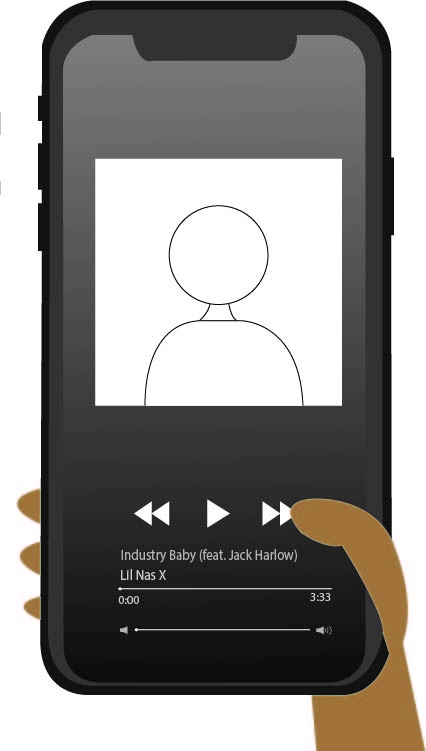The Rap Industry vs. Homophobia
October 7, 2021
For more than 20 years, rappers have been getting away with blatant homophobia both online and in front of large crowds, hindering the ability of the LGBTQ community to achieve equality. These malicious words and actions are continuously dismissed, letting the artists’ fame excuse them from being held accountable.
At the 2021 Black Entertainment Television (BET) Awards, a wardrobe malfunction prompted breakout rapper Lil Nas X to adjust his choreography using his hand to cover the split of his pants to the best of his ability. Combined with the suggestive dancing with his all-male
dancers and the kiss shared with one of the men near the end of the performance, his actions were criticized as overtly sexual. People with critical opinions on the performance looked to Twitter to share their thoughts. An article from Billboard states, “I’m sure he was paid a million dollars to wear this nonsense. This will cause other little boys that admire him to dress this way for free and I hate seeing men emasculated.” Both the extravagant red carpet outfit — which included a statement white gown and then a white suit adorned with roses — and performance outfit that took inspiration from Egyptian culture were criticized heavily alongside the performance itself. The heavily negative reaction to the kiss Nas shared with his dancer was different from the reactions heterosexual rappers recieve. Sophomore Isaak Blackburn emphasizes this observation by saying, “If a straight guy had a ton of female dancers and flirted with them, nobody cares. But Lil Nas kisses one dude and everybody loses it.” Despite the controversial kiss and outfits, junior Rama Bah notes that “he doesn’t care what anyone says. ‘Oh, you don’t like this?’ He makes jokes about the backlash… ‘You can say whatever you want, but I’ll keep doing my thing.’’
Lil Nas X’s impact on destigmatizing homophobia as a whole in the music industry is something to awe over, but regardless of his identity and general LGBTQ+ allyship, the rapper has still made his own mistakes. Blackburn emphasizes that although everything Nas has done has been remarkable, “Using the shock factor of men getting pregnant and erasing the fact that transmasculine people can still get pregnant is insensitive… He overlooked that.” Lil Nas X using the seemingly impossible idea of men getting pregnant as a way to promote his album reminds LGBTQ+ allies and community members that being queer does not automatically mean you are perfectly knowledgable of what is insensitive and what is not towards each separate identity.
In July 2021, contagiously popular rapper DaBaby attended the Rolling Loud festival in Miami and took to his large crowd to exclaim, “If you didn’t show up today with HIV, AIDS, or any of them deadly sexually transmitted diseases that’ll make you die in two to three weeks, then put your cell phone lighter up.” Freshman Bleu Carroz says, “I think the comments were very insensitive and disrespectful.” When DaBaby used Twitter to apologize a few days after the incident, senior Sejal Dogiparthi comments that they “feel like it was forced and not genuine… if you’re going to apologize, at least try to act [authentic].” The apology, which in summary says that anybody who has been affected by AIDS or HIV in the past was allowed to be upset and that DaBaby had no original intentions of upsetting people, was deleted two days after the original comments were made at the festival. In the days following the homophobic spiel, DaBaby was dropped by many other festivals and concerts, which Blackburn considers to be the only reason why he apologized at all. Rappers T.I and Boosie both came to DaBaby’s defense. Even though the original comments DaBaby made had nothing to do with Lil Nas, an article from Billboard quotes that Boosie “used slurs when discussing Lil Nas X,” referred to him as disrespectful, and even threatened to “beat” him.
Similarly, one of the most iconic rappers of the 2000s, Eminem, has maintained a stable fanbase and stardom for more than 20 years. Throughout the two decades, Eminem has continuously used the F-slur and derogatory words referring to other LGBTQ+ identities in many of his songs. Dogiparthi says, “I don’t think people understand the impact that certain words have or understand the history of certain slurs that are used in the LGBTQ+ community specifically. They don’t identify with the LGBTQ+ community so it doesn’t impact them in any way, it’s just a word to them.” Eminem has been called out a select amount of times, and according to an article from Variety, “Eminem expressed a degree of regret over referring to rapper Tyler, The Creator as a [F-slur] on his latest single during a September 13 interview with MTV’s Sway Calloway. But as usual, he stopped short of actually apologizing for his offending words. In fact, the next day he was back to gay-baiting on the new diss track “Killshot.””
From the start of the 21st century, rappers have been lazily apologizing for their indiscreet homophobia with little backlash overall. The first step in making any progress towards LGBTQ normalization is holding these stars to the same standards we should hold ourselves to; acceptance of what we did wrong, reflecting on our actions and what we will do to improve, apologizing to the people we hurt and explaining our plans to better ourselves, and taking the initiative towards that growth.
Many generations of music enjoyers have been listening to the artist Elton John. Regardless of John’s personal trailblazing actions, he has expressed immense amounts of respect and admiration for Lil Nas X. “Lil Nas X is a bold and brave provocateur who’s making amazing and inspiring music. He’s pushing the boundaries of urban music by wholeheartedly embracing his sexuality and visually projecting that celebration out into the world,” he said in an interview with Variety. His advocacy for LGBTQ+ individuals has been making great impact for years and years, and according to Carroz, is “one of the most known and loved queer people in the music industry”
— and they are right. Elton John has been living truthfully and unapologetically as himself for more than 50 years and has especially advocated for AIDS and HIV education. In response to DaBaby’s comments from the summer, an article from Variety explains how John engaged with his Twitter following to write, ““We’ve been shocked to read about the HIV misinformation and homophobic statements made at a recent DaBaby show… Stigma and shame around HIV and homosexuality is a huge driver of this vulnerability… We must spread compassion and love for the most marginalized people in our communities. A musician’s job is to bring people together.” Elton John’s advocacy and passion for the equality of the LGBTQ community throughout his entire career is something that has gone down and will continue to go down in history.
DaBaby, Eminem, Boosie, and Lil Nas X are all stars in the same genre, and while it is widely known that rappers will disparage each other for publicity, targeting someone for their sexuality sinks competition to a new low. Advocacy and progression for equal rights will forever be stunted if music’s most popular genre and stars refuse to grow and the public refuses to hold them accountable.




